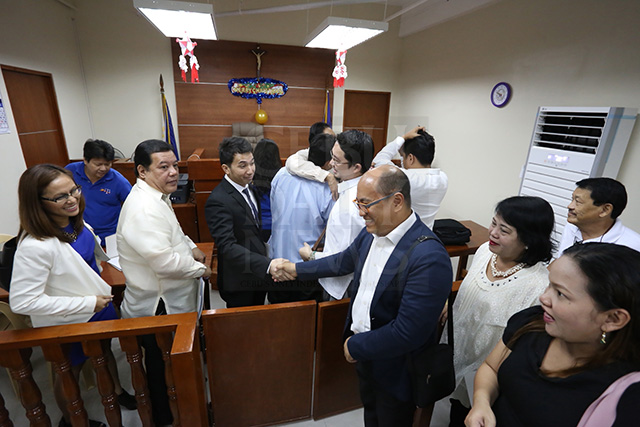
UP Cebu lawyers led by Francis Michael Abad (third from left) and Cebu City government’s lawyers led by Carl Vincent Sasuman exchange pleasantries after the hearing in the sala of RTC Judge Ricky Jones (CDN PHOTO/JUNJIE MENDOZA)
Can the University of the Philippines Cebu (UP Cebu) secure another temporary restraining order from the court against the 72 settlers of sitio Avocado and Cebu City Hall?
Judge Ricky Jones Macabaya of the Regional Trial Court (RTC) Branch 5 is set to issue an order within the week on whether or not to issue a 20-day temporary restraining order (TRO).
He will also decide whether or not to extend an earlier order for the city to remove all its equipment and materials in sitio Avocado, barangay Lahug.
The 72-hour TRO earlier issued by Executive Judge Soliver Peras of the Cebu City RTC expires today.
Judge Macabaya, to whom the case was raffled, yesterday heard oral arguments on the civil case for injunction filed by UP Cebu against the city government.
Cebu City legal officer Carl Vincent Sasuman asked the court to dismiss the case, saying the arguments raised by UP are “moot and academic.”
“There is no need to talk since the City of Cebu already pulled out the machineries (for any reblocking activity in the area) and we don’t intend to put back the equipment there,” he said.
“I’m confused why UP filed a case against the city when we are not the one occupying the area. They should vent their anger by filing a proper action against the informal settlers,” he added.
UP lawyer Francis Michael Abad said the court needs to issue a TRO to stop “threats of invasion.”
“Although the city has pulled out its machinery, the informal settlers continue to build structures under the authority given by the city. Once the settlers build their houses again and reblocking of the area is finalized, the danger of injury is permanent and perennial,” he said.
Abad said the city government is supplying materials to informal settlers to help them rebuild their homes.
“The city doesn’t need to put their equipment in the area since the settlers are already rebuilding their houses through the materials from the city,” he said.
During the hearing, Sasuman questioned the authority of UP Cebu Dean Liza Corro in filing the case against the city. Sasuman said the case was filed by UP, not UP Cebu.
“According to jurisprudence, it is the burden of Dean Liza to prove that she has the authority and representation from UP. The plaintiff here is not UP Cebu. Therefore, based on jurisprudence, the court has jurisdiction over the case,” he said.
Sasuman said UP Cebu is an autonomous unit and is therefore “separate and independent” from UP.
“This complaint, with all due respect, is a mere scrap of paper,” he said.
Sasuman was accompanied by three other lawyers, city administrator Lucelle Mercado, and Division for the Welfare of the Urban Poor (DWUP) chief Collin Rosell.
UP lawyer Abad was accompanied by three other lawyers.
Abad clarified that the UP Charter of 2008 states that UP and all its campuses constitute one unit.
“It does not mean that it’s separate and has its separate identity from that of UP itself,” he said.
Abad maintained that UP is the owner of the lot occupied by the settlers.
“Possession under the law must be legal possession and actual possession without a legal interest is an anomaly and does not constitute possession in the eyes of law. UP retains the sole ownership and sole possession of the property although the actual occupation is made by another entity,” he said.
Jun Gulfan, president of the Lahug Cebu Homeowners Association (LACHOA), said the temporary restraining order only applies to equipment from City Hall and not to the settlers.
But UP legal counsel and associate solicitor Nielson Pangan said Regional Trial Court Judge Soliver Peras’s order specifically included the settlers as defendants in his TRO.